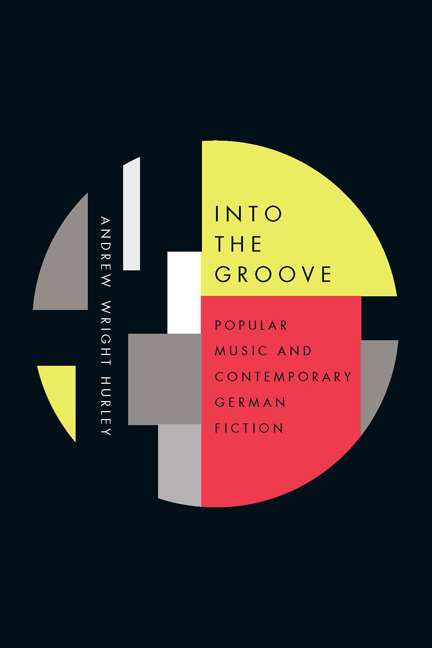Book contents
- Frontmatter
- Dedication
- Contents
- Acknowledgments
- Introduction
- 1 Preludes and Returns: Popular Music, the ʿ68 Generation, and the Literarization of the Jukebox
- 2 Enter the Double Agent: The German Popular Musician as Novelist
- 3 Techno-Lit: Electronica and Its Impacts on Fiction
- 4 Analogue is Better: Rock- and Pop-centric Literature
- 5 After the GDR's “Musical Niche Society”? Popular Music in the Literature of Thomas Brussig
- 6 The Gendering of Popular Music in the Novels of Karen Duve and Kerstin Grether
- Conclusion: Out of the Groove?
- Bibliography
- Index
4 - Analogue is Better: Rock- and Pop-centric Literature
Published online by Cambridge University Press: 05 May 2015
- Frontmatter
- Dedication
- Contents
- Acknowledgments
- Introduction
- 1 Preludes and Returns: Popular Music, the ʿ68 Generation, and the Literarization of the Jukebox
- 2 Enter the Double Agent: The German Popular Musician as Novelist
- 3 Techno-Lit: Electronica and Its Impacts on Fiction
- 4 Analogue is Better: Rock- and Pop-centric Literature
- 5 After the GDR's “Musical Niche Society”? Popular Music in the Literature of Thomas Brussig
- 6 The Gendering of Popular Music in the Novels of Karen Duve and Kerstin Grether
- Conclusion: Out of the Groove?
- Bibliography
- Index
Summary
Nostalgia, as a human condition, is defined by our use of popular song.
—Simon Frith, Performing RitesPopsongs [und Rocksongs] kennt jeder, sie wecken starke Assoziationen, und sie stellen ein simples Ordnungssystem bereit.
[Everybody knows pop [and rock] songs, they evoke strong associations, and they furnish a simple system of distinction.]
—Nils Minkmar, “304 Seiten Helmut”Andreas neumeister alloyed his interest in EDM with an attention to the past and to his musical socialization. Several “rock-centric” writers from the late 1990s and 2000s, for whom Matthias Politycki will serve as my example, would also attend to the musical past, albeit in more formally conservative ways than Neumeister. It is no coincidence that these rock-centric writers were left unmoved by EDM culture and by the various utopian promises that it seemed to hold out. The first part of this chapter examines this rock-centric strand of contemporary German literature and how it links the consumption of rock with an introspective, nostalgic mood as well as a certain “authenticist” and “masculinist” ideology. I will show how this backward-looking strand was consistent with “retro” trends within popular music during the 1990s as well as with an influential trope advanced in the Englishman Nick Hornby's popular 1995 novel High Fidelity. I will also show, however, that Politycki's refusal to invest in anything more than the private significance of popular music put him at odds with the pop Left.
“Rockists” like Politycki, however, were not the only ones to take up a musico-centric position largely distanced from the EDM-inspired experiments with form examined in the previous chapter. At the same time, several “neo-pop” writers—most notably the music journalist Benjamin von Stuckrad-Barre—also entered the field. They took inspiration from a certain ironic notion of “pop” that had been current in the 1980s. I will argue that this strategy was a complicated one.
- Type
- Chapter
- Information
- Into the Groove?Popular Music and Contemporary German Fiction, pp. 119 - 158Publisher: Boydell & BrewerPrint publication year: 2015



